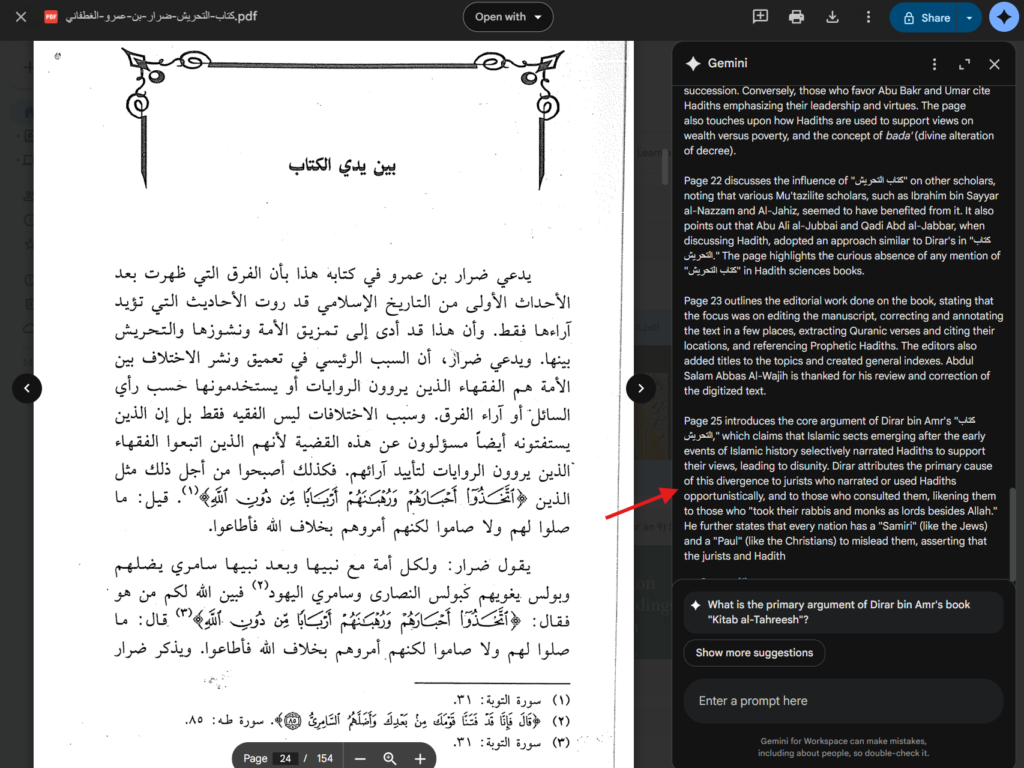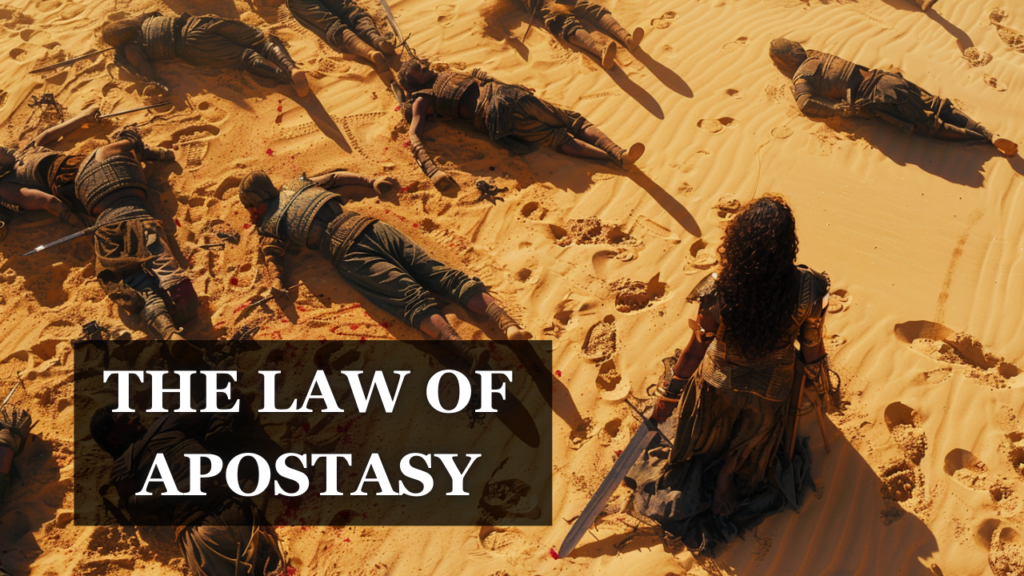Dirār ibn ʿAmr al-Ghaṭṭāfānī (d. ca. 845/220 AH) was a Basran judge known for “radical” rationalist views. In his Kitāb al-Taḥrīsh (“Book of Instigation/Agitation”), he criticizes the misuse of Prophetic traditions (ḥadīth) by rival sects. He argues that such narratives have torn the Muslim community apart. He blames jurists and partisans for inventing or selectively citing ḥadīth to support their own doctrines. Dirār’s theology is often classed as proto-Mu‘tazilī or Khārijī; he insisted on strict unity and reason, and rejected all but universally agreed-upon religious proofs.
Dirār’s central thesis is that each faction in the early Islamic community “clung to a category of ḥadīth to support its own doctrine,” resulting in mutual hostility and even excommunication among Muslims. He writes:
„…وَتَعَلَّقَ كُلُّ فِرْقَةٍ مِنْهُم لمَذْهَبِهِ بِجِنْسٍ مِنَ الحَدِيثِ“
“…and each sect attached itself to a kind of ḥadīth for its doctrine.” (p. 113)
This quote underscores Dirār’s central argument: every sect within the early Muslim community selectively used Prophetic reports to validate its own theological stance. He provides several striking examples to illustrate this point:
- The Khawārij (extremist separatists) invoked traditions such as: “ʿAlaykum bil-jamāʿa fa-inna yad Allāh ʿalayhā”
“Man fāraqa al-jamāʿa qayda shibr faqad khalaʿa ribqata al-islām min ʿunuqih”
(“Hold fast to the community, for God’s hand is upon it”; and “Whoever separates from the community even by a handspan has cast off the yoke of Islam from his neck.”)
These hadiths were used to justify loyalty to the dominant group and condemn those who dissent. - The Murjiʾa (advocates of deferred judgment on sinners) cited sayings such as: “Lā ilāha illā Allāh mukhliṣan dakhala al-janna wa lam tamsas-hu al-nār … wa in zana wa in saraqa”
(“Whoever says ‘There is no god but God’ sincerely will enter Paradise and will not be touched by the Fire … even if he commits adultery and theft.”)
This tradition underpinned their belief that faith alone, not deeds, guarantees salvation. - The Qadariyya (proponents of free will) relied on: “Kullu mawlūd yūladu ʿala al-fiṭra…”
(“Every child is born upon the natural disposition [fiṭra]…”)
This supported their view of innate human responsibility and moral autonomy. - The Rāfiḍa (extremist Shīʿa factions) referred to traditions like: “Layaridanna ʿalayya al-ḥawḍ aqwām … fa-aqūlu: man rabbī?”
(“Groups will come to me at the [heavenly] Pool … and I will say: ‘Who is my Lord?’”)
This was interpreted to mean that many Muslims had strayed so far that even the Prophet would disavow them.
Dirār meticulously catalogs such examples (often contradictory) to argue that there is no coherent or universally reliable ḥadīth corpus. He concludes that these sectarian hadiths caused profound disunity:
“Disagreement arose, sects multiplied, bonds between Muslims were severed, and each group declared the other to be unbelievers.”
Consistent with his critique, Dirār holds that only the Qurʾān and consensus (ijmāʿ) are binding after the Prophet. He famously states:
„إِنَّ الْحُجَّةَ لَا تَثْبُتُ بَعْدَ الرَّسُولِ صلى الله عليه وسلم إِلَّا بِإِجْمَاعِ الْأُمَّةِ، وَالإِجْمَاعُ وَجْهٌ عِنْدِي وَهُوَ حُجَّةٌ…“
“Argumentation [ḥujja] is not established after the Prophet…except by the consensus of the community. Consensus is, in my view, an authority: whoever contradicts it is astray, and whoever follows it is guided.”
Here, Dirār (quoted in Ibn Ḥazm’s introduction) explicitly denies any ḥadīth as proof unless the whole community has agreed. By this principle, he rejects the traditional Sunni reliance on Prophetic traditions. In practice, he trusts only the Qurʾān and rational argument. This rationalist stance – that “no proof is binding after Muḥammad except by consensus”- placed him outside emerging Sunni norms, which treated any soundly transmitted ḥadīth as authoritative.
Kitāb al-Taḥrīsh is not just a book on theology, but a political tract. Dirār blames the “jurists” and seekers of legal rulings for fomenting discord. He accuses legal experts of narrating whatever ḥadīth suited the questioner or their faction’s interests, tearing the community apart. As one commentary summarizes Dirār’s claim:
„يَدَّعِي ضِرَارُ بن عَمْرٍو فِي كِتَابِهِ هٰذَا أَنَّ الْفِرَقَ الَّتِي ظَهَرَتْ بَعْدَ الأَحْدَاثِ الْأُولَى مِنْ التَّارِيخِ الإِسْلَامِيِّ قَدْ رَوَتْ الأَحَادِيثَ الَّتِي تُؤَيِّدُ آرَاءَهَا فَقَطْ، وَأَنَّ هٰذَا قَدْ أَدَّى إِلَى تَمْزِيقِ الْأُمَّةِ وَانْشِزَازِهَا وَالتَّحْرِيْشِ بَيْنَهَا“
In other words, “Dirār claims that the sects which emerged after the early events of Islamic history narrated only those hadiths that supported their opinions – and that this led to the tearing apart (tamzīq) of the community, its breakup and instigation against one another”. He therefore portrays doctrinal conflict as a consequence of opportunistic hadith collection. For Dirār, the true “leadership” (imāma) must be established by the Qurʾān and communal ijmāʿ, not by disputable reports.
Contrast with Proto-Sunni Orthodoxy
Dirār’s positions stand in sharp contrast to the developing Sunni orthodoxy of the 9th–10th centuries. Mainstream Sunnis regarded a broad corpus of Prophetic reports as binding law after the Qurʾān; Dirār, by contrast, rejects all but universally accepted ones. He effectively casts suspicion on every hadith that served a particular creed. Where Sunni jurists and theologians defended ḥadīth as the “second source” of law and creed, Dirār calls it the instigator (muharriš) of division. In his view, the true safeguard is ijmāʿ and the unified Qurʾānic message. This early rejection of hadith authority foreshadows later Mu‘tazilī thought (which also prized reason and consensus), but in Dirār’s case, it went further – he even encouraged armed rebellion against judges who relied on ḥadīth he deemed spurious.
In summary, Dirār’s Kitāb al-Taḥrīsh argues that sectarianism in Islam resulted from each group’s selective use of Prophetic traditions. He bluntly states that “each faction clung to a kind of ḥadīth for its doctrine”. He only accepts Qurʾān and community consensus as valid law. These arguments led him to challenge the nascent Sunni consensus, making him a controversial figure. His critique of hadith and emphasis on unity mark Kitāb al-Taḥrīsh as one of the earliest systematic rebuttals of traditional ḥadīth authority.

Dirār as a Precursor to Rationalist and Anti-Hadith Thought
Dirār’s work predates the fully formed Muʿtazilite and proto-Sunni schools, making him a transitional figure in Islamic intellectual history. His rejection of hadith-based polemics in favor of Qurān and consensus situates him as a rare, early voice for rationalist reform before the codification of orthodoxy. His views echo later anti-hadith sentiments, seen in some strands of Muʿtazila, the Qurān-alone (ahl al-Qurʾān) movement, and even modern Quranist thought. Most hadith-skeptical figures from the 2nd and 3rd centuries AH were either:
- executed or exiled (e.g., Jaʿd ibn Dirham),
- silenced through erasure, or
- straw-manned by mainstream compilers.
The survival of Kitāb al-Taḥrīsh is extremely rare. It allows us to hear a direct voice from the losing side of the hadith debate, rather than only seeing how opponents caricatured their views. Rather than focusing on theology alone, Dirār provides a meta-critique of sectarianism. His focus isn’t just that some hadith are unreliable, but that the very existence of sect-specific hadith is evidence of doctrinal corruption.
He doesn’t merely say: “These reports are false.”
He says, “The method of relying on hadith itself is what made you divided.”
Dirār wasn’t just an ivory-tower intellectual—he reportedly incited rebellion against unjust religious judges and rulers who ruled by “fabricated hadiths.” His views were radical enough that some biographers consider him a heretic (zindīq), while others feared even to transmit his name. Dirār ibn ʿAmr’s Kitāb al-Taḥrīsh stands as a rare surviving witness to a lost discourse, one in which hadith were not just questioned, but indicted as instruments of power, partisanship, and disunity. Dirār ibn ʿAmr’s Kitāb al-Taḥrīsh stands as a rare surviving witness to a lost discourse—one in which hadith were not just questioned, but indicted as instruments of power, partisanship, and disunity.
Full book in Arabic: https://archive.org/details/20210630_20210630_1620


Many thanks for guiding us correctly!